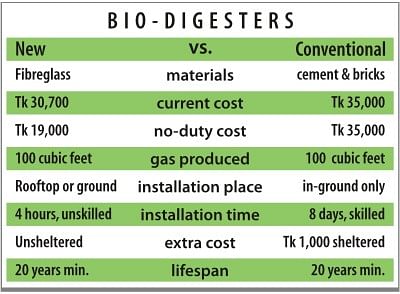Low-cost biogas digester may soon brighten villages

The Bangladesh Council of Scientific and Industrial Research (BCSIR) is commercialising its new, low-cost portable biogas digester with the help of a private company and expects it will help thousands of villages become self-sufficient in energy.
BCSIR, the only multi-purpose industrial research and development institute in the country, signed a contract on July 21 with Win Sources Ltd to sell the Portable Commercial Fiber Glass Bio-Gas Digester. Win will promote the product with the help of BCSIR researchers.
Prior biogas digesters designs used bricks and cement for the dome, and cost approximately Tk 35,000. The installed cost of the new fibreglass digester is approximately Tk 30,700 -- and it could be much lower once duties on fibreglass are dropped, as the government has promised.
On July 21 the prime minister quietly inaugurated the second biogas project, the Commercial Fiber Glass Bio-Gas Digester, at Gonobhaban. BCSIR set up a cow farm at Gonobhaban to supply dung to produce biogas.
China is the only other country that produces this kind of biogas digester. But the production cost of this digester is far lower than that of a digester imported from China, which costs around Tk 60,000.
Dr Md Abdur Rouf, principal scientific officer, and Md Saiful Islam, scientific officer of BCSIR, jointly invented the new fibreglass digester in Bangladesh.
Bio-gas plants use farm waste to produce gas that can be used for cooking or generating electricity. The daily production of gas is around 100 cubic feet. The by-product of the plant is a superior organic fertilizer.
The new bio-gas digester is made of glass fibre and resin shaped into a big hollow ball. It can be installed within 50 square feet and has a maximum height of 9 feet. Unlike traditional designs that can be installed only underground, it can be installed any place, even on a roof.
Saiful Islam, one of the inventors of the biogas digester plant, told The Daily Star that the digester may continue in service, without damage, for up to 100 years.
Saiful also said a study pegs the demand for biogas plants in Bangladesh at around 4 million units.
The new digester is made of fibreglass, which is now imported from different countries with a 60 percent duty. Saiful said that if the import duty were zero, almost 40 percent of the cost could be saved.
The prime minister has already ordered the officials to include Commercial Fiber Glass Bio-Gas Digester under the renewable energy items category so that it can be imported with no duty.
Professor SM Imamul Huq, chairman of BCSIR, said, "I have also requested Win Sources to make this product available at the rural areas by keeping a low profit margin, so that general people can get maximum benefit from it.”
ATM Mahbubul Alam, managing director of Win Sources, said, "We are planning to start a pilot project covering two districts where we will give training to the villagers on troubleshooting issues of the plant."
"In 2010 we will install around 3,500 (units) under the pilot project, and we will attempt to cover every village of the two selected districts," he added.
In 1976, Mymensingh Agricultural University first installed a prototype of a traditional kind of plant in the university premises. In the same year, BCSIR installed a plant at their offices. Neither was commercially viable.
From 1997 to 2004, the government ran two projects on biogas plant installation, and the BCSIR installed 22,000 plants across the country; more than any other organisation. Currently, the number of biogas plants is around 45,000.
The government is working on many other village self-sufficiency projects to implement its election slogan "akti bari, akti Khamar" (One house, one farm).

 For all latest news, follow The Daily Star's Google News channel.
For all latest news, follow The Daily Star's Google News channel. 



Comments